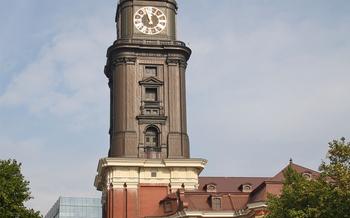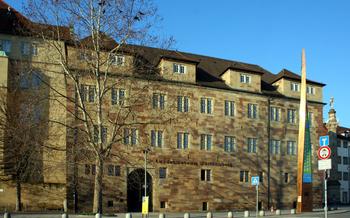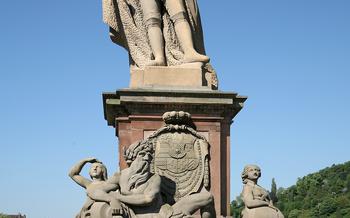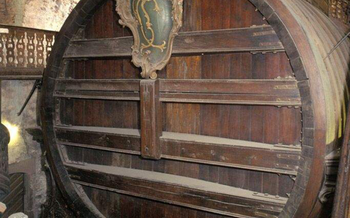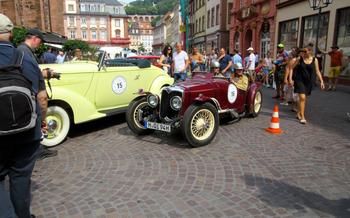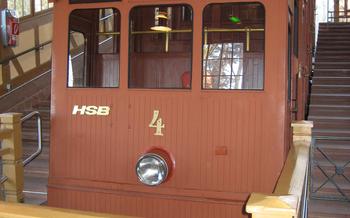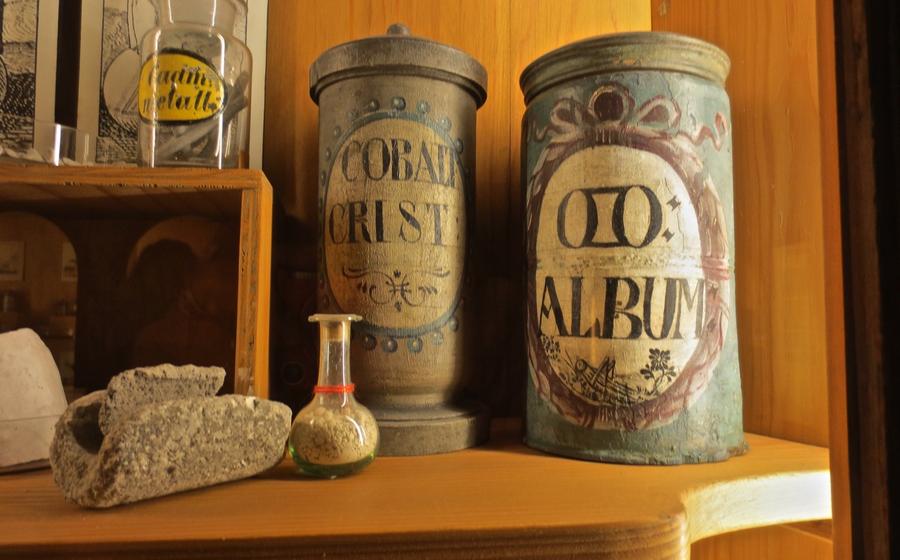
The German Pharmacy Museum
- Pharmacy Through the Ages
- Interactive Exhibits and Demonstrations
- Traditional Apothecary and Laboratory
- The Art of Pharmaceutical Packaging
- Pharmaceutical Advertising Through the Years
- The Dark Side of Pharmacy
- Pharmacy in Popular Culture
- Temporary Exhibitions and Special Events
- Educational Programs and Workshops
- Research and Documentation Center
- Museum Shop and Souvenirs
- Accessibility and Facilities
- Insider Tip:
Pharmacy Through the Ages
The German Pharmacy Museum offers a comprehensive journey through the evolution of pharmacy, showcasing the progression from ancient herbal remedies to modern pharmaceuticals. Visitors can explore the fascinating history of drug preparation techniques and advancements in medical knowledge. The museum highlights the contributions of renowned pharmacists and scientists who have shaped the field of pharmacy. Through interactive displays and educational programs, visitors gain insights into the development of medicines and their impact on healthcare throughout history.
Interactive Exhibits and Demonstrations
The German Pharmacy Museum brings history to life with its engaging interactive exhibits and demonstrations. Visitors can step into the shoes of a pharmacist from the past and experience the challenges of preparing medicines using traditional methods. Live demonstrations showcase the intricate processes involved in creating remedies from natural ingredients, providing a fascinating glimpse into the world of early pharmacy. Interactive displays allow visitors to explore the properties of medicinal plants, test their knowledge of pharmaceutical history, and even create their own virtual prescriptions. These hands-on experiences not only enhance the museum experience but also foster a deeper understanding of the evolution of pharmacy and the dedication of those who have shaped this field.
Practical Tip: Inquire about upcoming events or demonstrations during your visit. The museum often hosts workshops, lectures, and special programs that provide unique insights into the world of pharmacy.
Traditional Apothecary and Laboratory
Step into a bygone era as you explore the meticulously recreated traditional apothecary within the German Pharmacy Museum. Immerse yourself in the atmosphere of a historical pharmacy, complete with authentic tools, equipment, and ingredients used by pharmacists of the past. Marvel at the intricate scales, mortars and pestles, and ceramic jars that line the shelves, each holding a story of medicinal preparation.
In the adjacent laboratory, discover the secrets of pharmaceutical research and development. Learn about the evolution of drug formulation and the painstaking processes involved in creating medicines. Observe replicas of historical laboratory equipment, such as distillation apparatuses and microscopes, and gain insights into the scientific advancements that have shaped modern pharmacy.
Don't miss the opportunity to witness live demonstrations or workshops that bring the past to life. Watch skilled demonstrators recreate traditional medicinal practices, such as compounding herbal remedies or preparing tinctures. These interactive experiences offer a unique glimpse into the world of pharmacy's rich history.
The Art of Pharmaceutical Packaging
The German Pharmacy Museum showcases the evolution of pharmaceutical packaging, from simple containers to elaborate designs. Packaging has played a crucial role in preserving and marketing medicines throughout history. Visitors can explore a diverse collection of packaging materials, including glass bottles, ceramic jars, metal tins, and cardboard boxes. Each item reflects the technological advancements and artistic trends of its time.
One highlight of the collection is a rare 18th-century apothecary jar made of intricately painted porcelain. The jar was used to store precious spices and herbs, and its exquisite design demonstrates the artistry of the period. In contrast, a 19th-century tin box for headache powders features a bold and colorful graphic design, showcasing the shift towards mass-produced packaging.
The museum also examines the role of packaging in marketing and branding. Visitors can see examples of early advertising slogans and logos, as well as packaging that was designed to appeal to specific demographics or markets. From vintage cough syrup bottles with cheerful illustrations to sleek and modern pharmaceutical boxes, the collection offers a fascinating glimpse into the history of pharmaceutical packaging.
Practical tip: Take note of the museum's gift shop for souvenirs related to pharmaceutical packaging. You can find unique items such as vintage-style apothecary bottles, decorative tins, and even replicas of historical packaging designs, making for memorable keepsakes or gifts for any pharmacy enthusiast.
Pharmaceutical Advertising Through the Years
The German Pharmacy Museum also delves into the fascinating world of pharmaceutical advertising, showcasing how medicines have been marketed and promoted throughout history. From the early days of print advertisements in newspapers and magazines to the advent of radio and television commercials, the museum explores the evolution of pharmaceutical advertising and its impact on consumer behavior.
Visitors can trace the changing strategies and techniques used by pharmaceutical companies to promote their products, from simple product descriptions to elaborate campaigns featuring celebrity endorsements and emotional appeals. Notable advertising campaigns or slogans from the past are highlighted, providing insights into the history of marketing and the ways in which medicines have been presented to the public.
Vintage pharmaceutical advertisements displayed in the museum offer a glimpse into the changing attitudes and perceptions surrounding medicines and healthcare. These advertisements often reflect the prevailing social and cultural norms of their time, providing a unique perspective on the history of pharmacy and its relationship with the public.
The Dark Side of Pharmacy
The German Pharmacy Museum does not shy away from addressing the ethical dilemmas and controversies surrounding the pharmaceutical industry. It explores the complex issues of drug addiction, side effects, and the high cost of medications, providing a balanced perspective on the industry's impact on society. The museum presents these topics through informative exhibits, thought-provoking discussions, and interactive displays. Visitors are encouraged to engage in critical thinking and discussion about the ethical implications of pharmaceutical practices. By shedding light on these complex issues, the museum aims to foster a greater understanding of the challenges and responsibilities faced by the pharmaceutical industry.
Pharmacy in Popular Culture
In the realm of popular culture, pharmacies and pharmacists have often been depicted in literature, film, and television. One memorable example is the character of Mr. Gower, the pharmacist in the classic novel and subsequent film adaptation of "To Kill a Mockingbird." Mr. Gower's wisdom and kindness, as he dispenses not only medicine but also advice and compassion, have left an indelible mark on readers and viewers alike.
Another notable portrayal is that of Horace, the apothecary in Shakespeare's tragedy "Romeo and Juliet." Horace's illicit sale of poison to Romeo sets in motion the tragic chain of events that leads to the play's heartbreaking conclusion. These fictional representations, whether sympathetic or sinister, contribute to the public's perception of pharmacy as a profession that is both essential and intriguing.
Temporary Exhibitions and Special Events
The German Pharmacy Museum complements its permanent collection with a dynamic program of temporary exhibitions and special events. These rotating displays offer visitors the opportunity to explore specific themes or topics in greater depth. The museum's curatorial team carefully selects these temporary exhibitions to present diverse perspectives on the history and impact of pharmacy.
Upcoming or ongoing exhibitions are highlighted on the museum's website and social media channels. Visitors can expect to encounter a range of themes, from the history of specific drugs or medical treatments to the impact of pharmacy on society and culture. These temporary displays often feature rare artifacts, interactive exhibits, and engaging storytelling that complements the museum's permanent collection.
Special events, such as lectures, workshops, and demonstrations, further enrich the museum experience. These events provide opportunities for visitors to engage with experts in the field, learn about current research, and gain hands-on experience with pharmaceutical practices. By attending these special events, visitors can deepen their understanding of pharmacy and its significance in our daily lives.
Planning your visit to coincide with a temporary exhibition or special event is a great way to enhance your experience at the German Pharmacy Museum. These rotating displays offer fresh perspectives and insights, allowing visitors to explore the diverse facets of pharmacy and its impact on society.
Educational Programs and Workshops
The German Pharmacy Museum offers a range of educational programs and workshops designed to cater to different age groups and interests. These programs provide an opportunity for visitors to delve deeper into the fascinating world of pharmacy and its history.
School Programs: Tailored specifically for school groups, these programs offer interactive learning experiences that align with educational curricula. Students can participate in hands-on activities, guided tours, and workshops that explore the evolution of pharmacy, the science behind medicines, and the ethical considerations surrounding the pharmaceutical industry.
Adult Workshops: Designed for adults with a passion for history, science, or healthcare, these workshops offer in-depth exploration of specific topics related to pharmacy. Participants can learn about the history of drug discovery, the process of drug manufacturing, or the role of pharmacists in healthcare systems.
Family Workshops: Catering to families with children, these workshops provide a fun and engaging way to learn about pharmacy together. Families can participate in interactive activities, storytelling sessions, and hands-on experiments that make learning about pharmacy both enjoyable and educational.
Practical Tip: Inquire about upcoming workshops or programs during your visit to the German Pharmacy Museum. Pre-registration is recommended to secure your spot.
Research and Documentation Center
The German Pharmacy Museum houses a comprehensive research and documentation center dedicated to preserving and disseminating knowledge about the history of pharmacy. This center serves as a valuable resource for researchers, scholars, and students interested in exploring the field's rich heritage.
The center's collection includes an extensive library of books, manuscripts, and archival materials related to pharmacy. These resources provide a wealth of information on various aspects of the profession, from the development of pharmaceutical sciences to the evolution of drug preparation techniques.
Researchers can access these resources by appointment and receive assistance from the museum's knowledgeable staff. The center also offers opportunities for collaboration and research projects with scholars from various disciplines.
Practical tip: To make the most of your research visit, contact the museum's research department in advance to discuss your specific interests and arrange for access to the center's resources.
Museum Shop and Souvenirs
The German Pharmacy Museum houses a charming gift shop that offers a treasure trove of unique and memorable souvenirs related to pharmacy and the museum's collection. From vintage-inspired apothecary jars and miniature replicas of historical medical equipment to books on the history of medicine and pharmaceutical science, the shop caters to a wide range of interests.
One of the highlights of the museum shop is its selection of traditional apothecary items. Visitors can purchase replicas of antique mortars and pestles, glass vials, and ceramic ointment pots, allowing them to recreate the atmosphere of a bygone era. For those interested in herbal remedies, the shop offers a variety of dried herbs, teas, and tinctures, carefully curated from historical recipes.
The museum shop also stocks a wide range of books on pharmacy and related topics, including historical accounts, biographies of famous pharmacists, and guides to medicinal plants. These books provide an excellent opportunity for visitors to delve deeper into the fascinating world of pharmaceutical history and science.
By purchasing souvenirs from the museum shop, visitors not only take home a memento of their visit but also support the museum's mission to preserve and promote the history of pharmacy. The proceeds from the shop help fund educational programs, research initiatives, and the ongoing maintenance of the museum's collection.
Practical tip: Browse the museum shop before or after your visit to discover unique gifts and souvenirs that will remind you of your journey through pharmaceutical history.
Accessibility and Facilities
The German Pharmacy Museum has taken great strides to ensure accessibility for visitors with disabilities. Wheelchair ramps and elevators provide easy access to all floors of the museum. Spacious corridors and wide doorways accommodate visitors with mobility impairments. The museum also offers wheelchairs for temporary use, upon request.
Inside the museum, visitors will find comfortable seating areas throughout the galleries, allowing them to rest and take breaks as needed. A cloakroom is available for storing coats and bags, and restrooms are conveniently located on each floor.
Families with young children are welcomed at the museum. A designated family area provides a space for children to play and learn, while parents can explore the exhibits at their own pace. The museum also offers a variety of educational programs and workshops tailored to different age groups, making it a fun and educational experience for the whole family.
Insider Tip:
For a truly unique experience, head to the museum's hidden gem—the secret garden. Nestled amidst the historic buildings, this tranquil oasis offers a serene escape from the bustling city. Take a moment to relax and reflect on your journey through pharmaceutical history as you admire the beautiful flowers and plants that adorn the garden. Remember to capture the essence of this special place with a few photographs, and don't forget to share your #PharmacyMuseumMoments on social media. After your visit, indulge in a delicious treat at Café Apotheke, located just around the corner from the museum. Their mouthwatering pastries and aromatic coffee are the perfect way to end your day of exploration.



